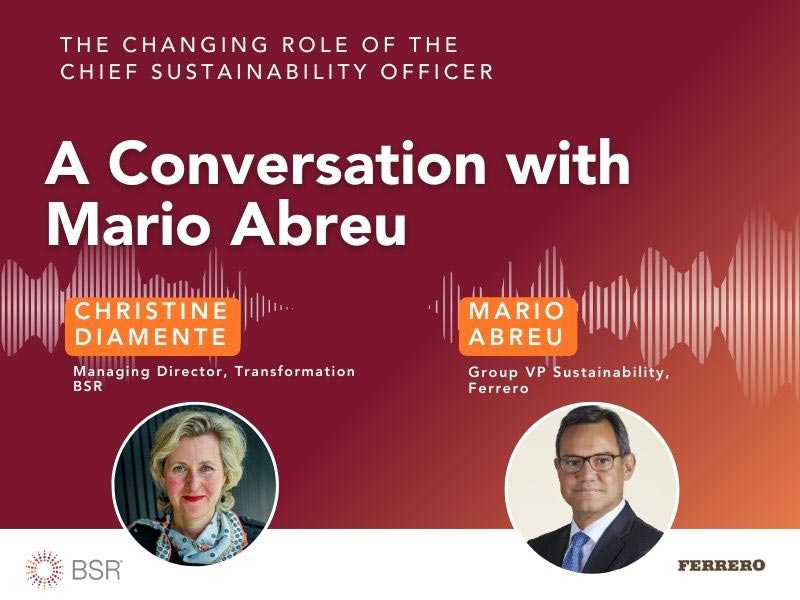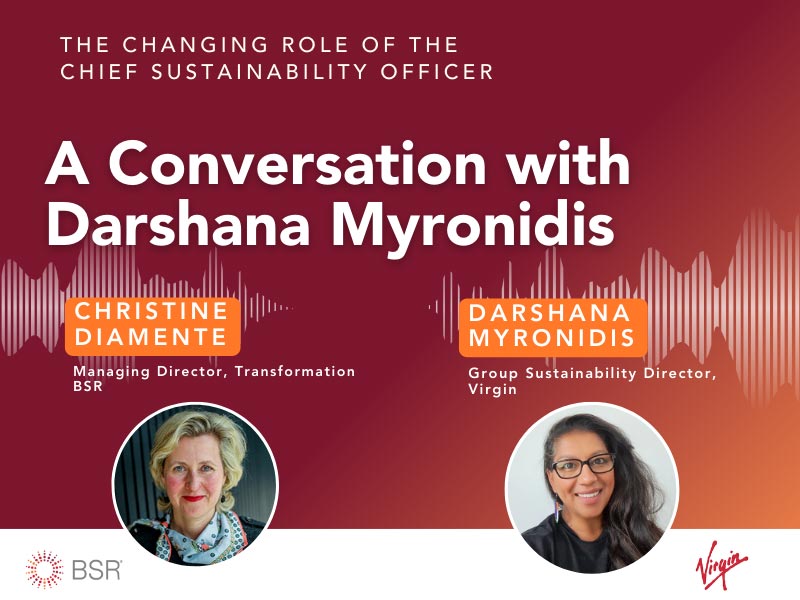In June 2022, BSR and the National Association of Corporate Directors (NACD) collaborated on a joint climate scenarios workshop for NACD’s Climate Continuous Learning Cohort, a group of approximately 50 current and future corporate directors. The workshop demonstrated the potential and value of climate scenarios to navigate climate risks and opportunities for boards in an era of increased transparency and duty of care.
Context
NACD is a member organization for corporate directors aiming to expand their knowledge, grow their network, and maximize their potential. It has worked with members for over 40 years to help improve their performance and create long-term value for their businesses. In March 2022, NACD launched a Climate Continuous Learning Cohort, a year-long learning initiative for peers to connect, share knowledge, and learn from each other. The program offers thought leadership in collaboration with NACD's community of experts, leading directors, and trailblazing companies to advance climate proficiency in the boardroom.
The Challenge
Boards are increasingly aware that addressing climate change is essential to building resilient business strategies. The energy transition, commodity costs and availability, extreme weather disruptions, climate justice, regulatory shifts—all have the potential to pose existential risks and provide opportunities for business.
Investors are shining a spotlight on these risks, like when the world’s largest asset managers call on boards to oversee climate disclosures or when the largest banks implement aggressive plans for decarbonization and climate risk management. Regulators and standards-setters around the world are also stepping up expectations for boards, often in alignment with recommendations from the Task Force for Climate-Related Financial Disclosure (TCFD). The International Sustainability Standards Board (ISSB), the US Securities and Exchange Commission (SEC), the EU Corporate Sustainability Reporting Directive (CSRD), the EU Corporate Sustainability Due Diligence Directive (EU CSDDD), the Japanese Financial Services Agency, and others are all poised to implement mandatory corporate climate disclosures that lodge responsibility for oversight with boards.
In light of both the growing urgency of climate change on the board agenda and the prevailing lack of climate expertise on boards, NACD reached out to BSR to collaborate on a climate scenarios workshop, based on our sustainability and board advisory expertise, our work on futures and scenario planning, and the reach of our global membership.

BSR’s Response
Building on work by the Network for Greening Financial Services, BSR tailored three scenarios to imagine potential versions of the world in 2030 and what they would mean for a fictive healthcare company. (While BSR typically facilitates customized scenarios workshops for participants from a single company, BSR adapted the approach to train directors from multiple businesses.) The scenarios addressed direct climate impacts as well as cross-cutting social, technological, economic, environmental, and political factors. NACD workshop participants collaborated to discuss risks and opportunities that each scenario would pose for the healthcare company.
BSR facilitators then led the group into the most crucial part of the conversation: If the participants were on the board of the healthcare company, what steps would they take to govern the company for future success and resilience across all scenarios?
Participants shared ideas for enhancing the board’s composition, structure, strategic engagement, oversight, and accountability measures. They identified questions for management and for boards to consider.
Examples of questions from the Board to management included:
- How might climate-related developments affect our business model and value chain? What alternative business models or approaches can be used to mitigate climate risk and unlock value?
- How ambitious do we want to be and when? What are the advantages/disadvantages of being an early vs. late mover?
- What are our biggest climate risk areas? How does this fit into enterprise risk management?
- How are we preparing for new reporting guidance (EU CSRD, CSDDD, SEC, ISSB, etc.)?
Examples for the Board included:
- How do we ensure a threshold of climate and ESG knowledge across all board members? How can we embed climate/ESG across all board committee charters?
- Do we have the right skills to address climate, including how it relates to existing focus areas such as policy, supply chain, geopolitics, etc.?
- Do we have access to insights from outside experts and stakeholder perspectives?
- How do we maintain a holistic understanding of climate and ESG impacts so that we don't look at issues in a vacuum?
Impact
The exercise brought to life several keys to success in using scenario analysis:
- Create engagement and ownership among the participants. Arguably more important than the actual output is that the participants drive the process themselves and take ownership of their relevance.
- Use scenario analysis to build capabilities, expand vision, and reveal blind spots—not to choose “the most likely” scenario. Single-point forecasts are often wrong, and basing efforts on one scenario can potentially expose a company to risk.
- Tailor the exercise to the specific company, its value chain, business model, and stakeholders, based on commonly accepted, science-derived inputs.
- Consider climate scenarios with a broad range of outcomes and that consider social, technological, environmental, economic, and political developments. Narrow scenarios can fail to account for reality of risk.
- Consider physical and transition factors, as well as acute and chronic climate impacts. Climate risk is not “just” about storms and floods.
- Identify actions by the board and management that promote business resilience across a diversity of potential scenarios, aligned with respective roles. Scenarios should not be an intellectual exercise.
Participants hailed the exercise as invigorating, educational, and strategically valuable. One participant noted that, “When it comes to climate, an issue that can shape the strategic direction of the company in the long-term, this can get boards to think in more broad and diverse perspectives.” By engaging those perspectives, another participant commented, “It brings wide-ranging considerations to the table—from capital allocation to changes in talent development and complex reporting.” Another participant summarized: “It forces the discussion and thinking further, which should lead to a more robust strategy.”
One participant put it more plainly: a scenarios exercises for the board “helps minimize 'oh shit’ moments.”
Conclusion
Training on fundamentals of climate change—such as those conducted by NACD—are essential to build the knowledge base of board members. Scenario exercises for boards take that engagement a step farther to look at the specific company and the broad context, strategic implications, and the role of the board in building resilient business strategies.
[The] NACD and BSR partnership has proven to be a strong one, as the board members who participated in the workshop found it interactive, relevant, and practical. Through the breakout discussions, the BSR team was able to provide actionable knowledge on how to evaluate and navigate climate risks and opportunities, regardless of industry. I truly valued BSR’s expertise and enthusiasm while working on this project!
-Ghita Alderman, Associate Director, ESG Content, NACD
Get in Touch
BSR looks forward to partnering further with Boards on how to build resilient business strategies that create long-term value for business and society. If you would like to discuss this topic further, please reach out to our Sustainability Management team.








